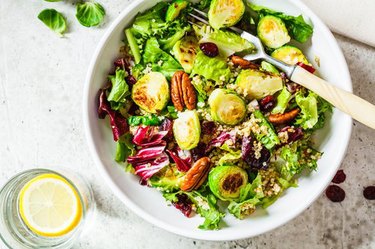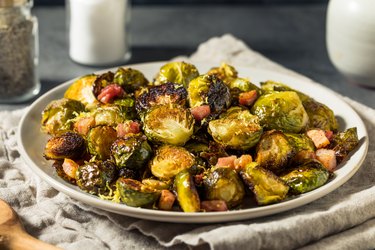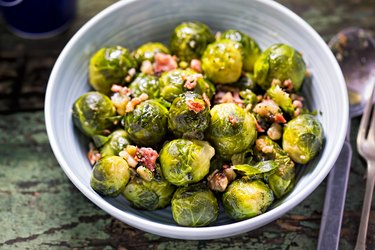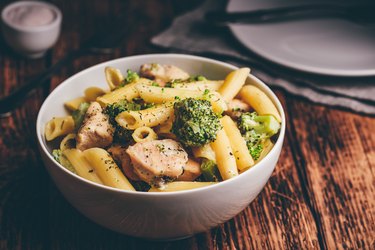
Yes, Brussels sprouts support your digestive health, but they can also cause GI symptoms, such as gas.
If that's the case for you, you may find yourself avoiding them entirely — but you shouldn't have to miss out on their health benefits and flavor.
Video of the Day
Video of the Day
Why Do Brussels Sprouts Cause Gas?
"Brussels sprouts contain a class of carbohydrates called fructans, which certain people, especially those with irritable bowel syndrome (IBS), have difficulty digesting," says dietitian and recipe developer Tia Glover, RD. "This can lead to gas, bloating and general discomfort."
One cup of cooked Brussels sprouts contains 4.1 grams of fiber, per the USDA, so it may trigger gas in some people. Adding too much fiber into your diet quickly can result in more gas, according to the Mayo Clinic.
Within that fiber exists a specific type of carbohydrate, called raffinose, that may be the culprit. "Our bodies can't digest the raffinose in Brussels sprouts, and it's instead fermented by bacteria in our colon, leading to the production of gas that our bodies must release," says Christina Badaracco, MPH, RD.
"Gas is a normal sign of healthy digestion."
Experiencing gas after eating Brussels sprouts can make them a little off-putting, but there are ways to reduce the unpleasant side effects. We asked registered dietitians for their top preparation and cooking tips that help make sprouts more tolerable — here's what they recommend.
How to Cook Brussels Sprouts to Reduce Gas
1. Boil Them First
If you're eager to make Brussels sprouts work for your gut, Brown recommends giving boiling a try. It's easy, quick and effective if you want to break down the fiber in the veggie to reduce the chances of gas.
Roasting is a popular way to cook this veggie, but cooking Brussels sprouts in water before roasting them can help reduce their gassiness.
"To help break down the fibers that often cause gas, boil your Brussels sprouts first," says Christa Brown, RDN, a dietitian and recipe creator. "The insoluble fiber that contributes to gassiness will be reduced in the cooking water," adds Christianna Gozzi, RD, LD, a dietitian and chef-instructor with IBS.
After boiling them, rinse them with cold water to stop them from getting mushy, and then place them in the fridge to enjoy throughout the week.
Even if you plan on using another cooking method, such as air-frying, Brown recommends starting with Brussels sprouts that have been boiled for at least 5 minutes. This ensures they are thoroughly cooked.
2. Pair Them With Fresh Mint
What you cook Brussels sprouts with may make a difference in how you digest them. Peppermint, for example, can help alleviate gas and make painful gas easier to pass, according to Mount Sinai.
"Sprinkling fresh mint leaves on top of roasted Brussels sprouts can offer some relief from the gas-inducing effects of this cruciferous vegetable," Gozzi says.
"Some people find that mint reduces gassiness and gastric distress. It has a calming effect on the digestive tract that relieves the pressure from gassiness caused by the breakdown of Brussels sprouts."
Tip
Badaracco also recommends cooking Brussels sprouts with fennel and ginger, which are known digestive aids.
3. Chop or Shred Them Into Smaller Pieces
Following a GI surgery, doctors often recommend chopping your food into very small bites and chewing thoroughly to make it more tolerable on your digestive tract. And this advice may be helpful if you get gas after eating Brussels sprouts.
"Cutting Brussels sprouts into smaller pieces gives your body a head start on digestion," Gozzi says. "Digestion starts in the mouth and the less work your body has to do to digest these cruciferous vegetables, the better your chances for comfortable digestion and less gassiness."
She recommends shredding Brussels sprouts and incorporating them into stir-fry recipes.
4. Eat Brussels Sprouts Cooked Instead of Raw
Eating your Brussels sprouts raw? That may be a contributor to gas.
"Cooking vegetables breaks down the cell wall of plants — this may make them easier to digest," says Jeanette Kimszal, RDN, NLC, a dietitian and recipe creator. "Cooking Brussels sprouts may reduce the fiber, glucosinolates (sulfur-containing compounds) and fructans, making them more tolerable and potentially less likely to cause gas."
Kimszal recommends putting down the raw veggies and trying cooking methods like boiling, blanching and roasting.
5. Try Fermented Brussels Sprouts
Fermented vegetables have long been associated with digestive benefits.
"Fermenting vegetables like Brussels sprouts relies on various types of good bacteria to convert carbohydrates like starch and sugar into alcohol or acid to preserve the food," Badaracco says. "This can enhance the bioavailability of many nutrients, introduce new nutrients, reduce sugar content and increase digestibility."
The fermentation process adds good bacteria, which can support digestive health, according to Harvard Health Publishing.
Eating Brussels Sprouts More Often May Help, Too
It may seem counterintuitive, but eating sprouts more often can help reduce the gassy aftermath. Dietitians suggest eating them in small amounts but enjoying them often to make gas less frequent.
"If you're someone who doesn't eat Brussels sprouts or other high-fiber foods often, you will likely experience episodes of gas," Brown says. "Therefore, consider adding fiber-filled foods and vegetables to your diet slowly and in small amounts so that you give your body the chance to learn how to break down these fibers."
Be sure to cook them thoroughly and eat them often. As your body gets used to digesting them, you will soon be able to enjoy Brussels sprouts in larger quantities without getting too much gas after.


